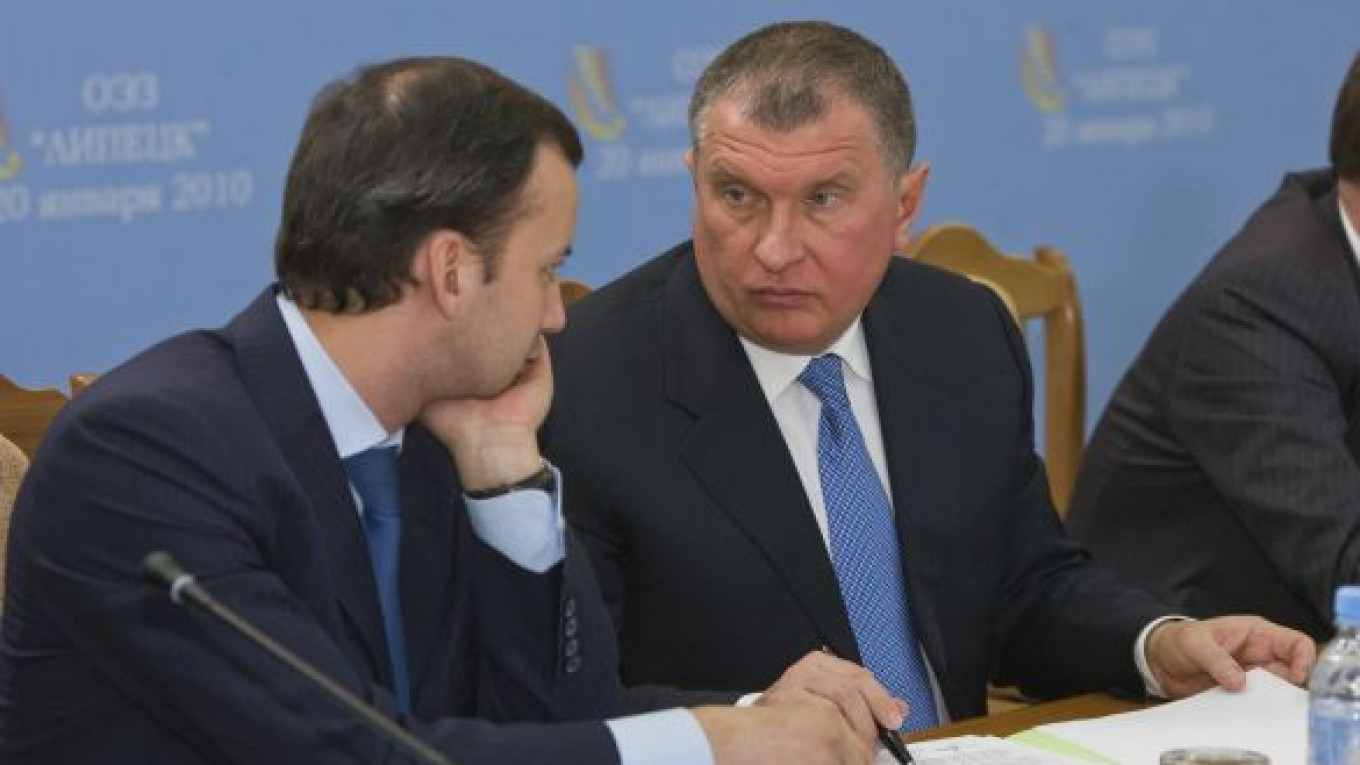State oil company Rosneft moved to tighten its grip on the Russian oil industry Thursday, making a cash-and-shares bid for British oil major BP's 50 percent stake in the country's third-largest oil producer, TNK-BP.
If the deal goes through, Rosneft will become the world's largest oil company in terms of output, surpassing ExxonMobil, said Yelena Yushkova, an analyst at investment company Solid, online newspaper Vzglyad.ru reported.
Sources familiar with the actions of BP, Rosneft and their advisers and financiers said a bid had been submitted to BP that valued the whole of TNK-BP at more than $50 billion. Rosneft already made an offer to AAR, BP's partners in the venture, to buy its stake.
"BP is reviewing options [with regard to the offer]," one source said.
The sources in London, Moscow and elsewhere have painted a picture of a potential three-way deal that could emerge over the coming weeks.
They said the British oil company and the four Soviet-born tycoons who own the other half of the business could emerge with minority stakes in an enlarged Rosneft plus billions of dollars in cash in exchange for a highly profitable company.
The combined group would dominate Russia's increasingly state-controlled oil industry and would be producing well over 4 million barrels of oil a day, more than U.S. No.1 ExxonMobil.
According to two sources familiar with the matter, Rosneft agreed Tuesday to pay the tycoons' AAR consortium $28 billion. However, sources in the finance sector said it was unlikely all of that would be in cash, especially if Rosneft intends to buy out BP as well.
About $15 billion could be met through a loan agreement Rosneft has been negotiating with international banks for weeks, and it can get another $3 billion from Russian banks, the sources said.
"There is a point where raising debt would have a negative impact on Rosneft's credit rating," said one banker, while another said $20 billion was the most Rosneft can borrow without putting a strain on its ability to refinance later.
Ratings agency Fitch warned Rosneft on Thursday that its credit rating "may be stretched" if it buys 50 percent in TNK-BP. Fitch said in a statement that Rosneft's fundamentals easily allow it to spend $15 billion for the purchase "while maintaining its current rating."
But the agency warned that any debt of more than $15 billion would like result in a downgrade.
Meanwhile, AAR does not intend to bid for BP's stake, Interfax reported, citing a source familiar with the situation.
BP and AAR had no comment on any potential agreement, while Rosneft spokeswoman Darya Yermolina said the company is evaluating "a number of opportunities" in the market. She would not confirm an upcoming deal, however.
Energy Minister Alexander Novak told Russian news agencies Thursday that the government doesn't believe Rosneft's possible purchase would hurt the sector.
"I don't think that would be a monopolist situation," he said in comments carried by Interfax. "We have rather strong competition in the market already."
Novak added that Rosneft had not informed the government of its plans regarding TNK-BP.
One opponent of a Rosneft buyout, Deputy Prime Minister Arkady Dvorkovich, said the government had yet to receive an application to approve a deal.
"I know that commercial discussions are under way, and as I understand, a memorandum of understanding has been signed, but no legally binding agreement," Dvorkovich was quoted by RIA-Novosti as saying.
Dvorkovich, who in May replaced Sechin as deputy prime minister for the energy sector, a position with traditionally more influence than the energy minister, has spoken against the expansion of state presence in the energy sector.
But Sechin is still believed to enjoy close ties with President Vladimir Putin and hold considerable influence over the oil and gas sector.
(Reuters, AP, MT)
Rosneft and Gazprom are allied against allowing private companies to operate offshore deposits, Interfax reported, citing a copy of a letter sent by Sechin and Gazprom CEO Alexei Miller to Putin.
The letter expressed the authors' worries about the liberalization of access to the development of offshore fields.
Currently, Gazprom and Rosneft hold a monopoly on offshore oil and gas production on the continental shelf.
Related articles:
A Message from The Moscow Times:
Dear readers,
We are facing unprecedented challenges. Russia's Prosecutor General's Office has designated The Moscow Times as an "undesirable" organization, criminalizing our work and putting our staff at risk of prosecution. This follows our earlier unjust labeling as a "foreign agent."
These actions are direct attempts to silence independent journalism in Russia. The authorities claim our work "discredits the decisions of the Russian leadership." We see things differently: we strive to provide accurate, unbiased reporting on Russia.
We, the journalists of The Moscow Times, refuse to be silenced. But to continue our work, we need your help.
Your support, no matter how small, makes a world of difference. If you can, please support us monthly starting from just $2. It's quick to set up, and every contribution makes a significant impact.
By supporting The Moscow Times, you're defending open, independent journalism in the face of repression. Thank you for standing with us.
Remind me later.






